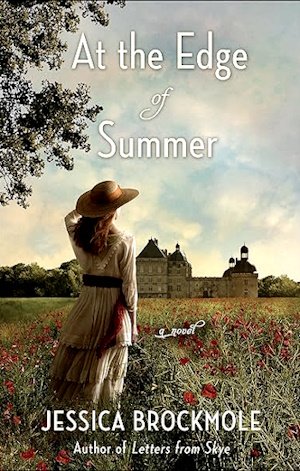“Clare,” he said. The first time he’d said my name in years. “Clare, will you?”
The question hung in the air. Behind me, the room quieted as artists and mutilés gradually filtered out, headed to suppers and homes and dreams still to come. Mine was right here.
“Luc.” I felt his name against the roof of my mouth. It tasted like summer. “I’ll help. Of course I’ll help.” I combed down his damp hair with my fingers. “But not only for the mask.” I hated the words as they came out of my mouth. “You have to do more than walk the streets again; you have to walk through life.”
He broke my gaze at last and put his face to a towel. “You make it sound so easy.” His voice muffled through the thick fabric.
“I know it won’t be.” I thought of Finlay, of his ups and downs, of his estrangement from his family, of those days when he had to fight with himself just to leave his flat. But also of his classes, Evelyn the model, and his newly hopeful letter. “But the mask is a bandage. To heal, there must be more.”
“Is there more?”
There had to be. Luc walked through the door of that studio, and suddenly the future stretched out, past the battlefields and shells. If he couldn’t step beyond all that, then what use was seeing the future at all?
I squeezed the wet sponge, leaving drops of water on my skirt. “Have you found employment?”
He shook his head. “Who would hire someone like me?”
“A hero of France?” My voice echoed in the room. Even Mrs. Ladd had gone down to the courtyard, to rinse the bowls and plaster brushes. “Plenty.”
That old guarded look was coming up again. “Wounds and medals don’t make a hero.”
“I’m sure you could take up your old place at the university. Finish your studies. War interrupted that.”
“But then what? I studied to be a teacher.” He wiped the corners of his eyes with a thumb. “I wouldn’t inflict myself on a roomful of students now.”
“You’ll have your mask.”
He stayed quiet. I didn’t know if he was considering or ignoring.
“Tennis?”
He reached to his shoulder in response. I wondered what old wound hid there. “Those days are past.”
“You could coach, I’d think. Couldn’t you?”
“Clare.” He sighed. “Don’t.”
“Maybe you need something new.” Water dripped into the basin. “I have a pamphlet I’ll send with you. There’s an institute now, you know.”
“To teach invalides and mutilés a trade. I know.”
I tried to push a brightness into my voice. “You can learn just about anything. Tailoring, shoemaking, tinsmithing. Clockmaking, I think. Typesetting, binding…oh, all sorts of things.” I blotted along the curve of his cheek. “I had one fellow who trained to be a bookkeeper. He thought of industrial design—that’s a choice, too—but decided—”
“Please stop.”
“Close your eyes again.” I moved the sponge to the skin beneath his brow. “Why not art, then?” I said quietly.
“Art?” Behind his lids his eyes moved. “I was never that good.”
“At teaching, you were.” Like at that lesson under the chestnut tree, my fingers were on his face. “I don’t know how you would have been at history or philosophy or whatever you were studying to teach, but as an art tutor, you were—” My voice caught. “You were very good.”
He exhaled against my wrist. I knew he was remembering the same scene. “And did it work?” he asked.
“Did what?”
“The lesson.”
“I ended up at the School of Art, after all.” I couldn’t keep the pride from my voice.
He smiled, the first one I’d seen in eight years. “See, you were too busy to miss me.”
“But I did,” I said without thinking. “Miss you.”
I expected more of that smile, but his face tensed. “Still so teasing, are you?”
“You once said you were always at my service.” The sponge reached the edges of his scar. “There were days I wished for a knight.”
“That night you spent in Paris,” he said. “You could have used one then.”
He had to be guessing. He didn’t know about the taxi ride to that house, about Stefan in the mirror, about the night huddled in the cemetery of a little white-stoned church. My fingers tightened on the sponge. “What do you mean?”
“What happened that evening.”
How could it be more than guessing? I didn’t tell him. I’d never told a soul. “I’m sure I don’t know what you’re talking about.” Water dribbled between my fingers.
“You didn’t travel with—”
“No,” I said, too quickly. The taste of Suze rose on my tongue, and it made me flush. I’d gone with Stefan. I’d taken the drink from him. I hadn’t locked the door. “I told you, nothing happened.” I dropped the sponge in the bucket with a splash.

























